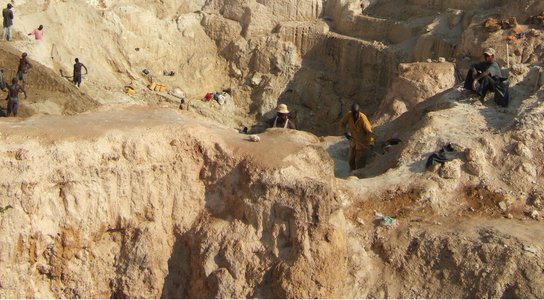In April 2019, Sudan’s social and political upheaval resulted in the removal of President Omar al-Bashir after nearly 30 years in power. Sudan has now entered a new period, where civilians share power with the Sudanese military in the ruling Sovereignty Council.
A militia named the Rapid Support Forces (RSF) is the most powerful paramilitary force in Sudan. At the head of the RSF – and vice chair of the Sovereignty Council – stands a man named Mohammed ‘Hemedti’ Hamdan Daglo.
Hemedti first rose to prominence in 2003 as one of the leaders of the Janjaweed, a paramilitary force deployed in Darfur which killed scores of civilians.
More recently, numerous witnesses accuse Hemedti’s RSF and Sudanese police of massacring pro-democracy demonstrators at a sit-in in Khartoum on June 3rd, 2019, with human rights groups reporting over 100 people killed. These killings fit a pattern of human rights abuses committed by the RSF and their predecessors, the Janjaweed, in Sudan’s western region of Darfur (see more below). Hemedti has denied the RSF was involved.
Now, an apparently genuine cache of leaked documents obtained by Global Witness show the financial networks behind Hemedti and the RSF. Not only have they captured a large part of the country’s gold industry through a linked company, but the leaked bank data and corporate documents show their use of front companies and banks based in Sudan and the UAE.
Some of the bank and corporate documents were originally published by satirical Sudanese online channel Al Bashoum, while others were obtained by Global Witness in the course of our investigation.
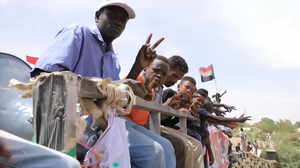
Sudan protestors in defiant mood as demonstrations go on in April 2019. © AP Archive
Global Witness has verified the documents using interviews, corporate records, and open source investigative methods including analysis of website infrastructure information.
We have concluded that the leaked documents are, in our opinion, likely to be genuine. In part 2 of this investigation we will publish more information about how we reached that conclusion.A leaked RSF spreadsheet also published by Al Bashoum reveals how they bought a fleet of almost one thousand Toyota pick-up trucks – easily converted into highly mobile ‘technicals’ with mounted machine guns – which have been used by the militia to suppress popular uprisings around the country for over a decade.
Video footage taken a few hours before the 3rd June massacre show large numbers of police and RSF militiamen arriving in Toyota Land Cruiser and Hilux vehicles. While we cannot be certain that the vehicles uncovered in this new evidence were the same ones used by the RSF and police on 3rd June, Global Witness has found dozens of videos on social media of similar vehicles – including from earlier shipments – being used to suppress demonstrations, beat and arrest protestors and to indiscriminately shoot in civilian areas.
This briefing provides a rare glimpse into the finances of the RSF, an organisation whose military power and financial independence poses a threat to a peaceful democratic transition in Sudan.
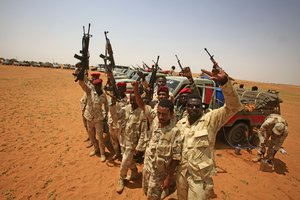
RSF celebrate in Gouz Abudloaa after the capture of migrants trying to cross into Libya, surrounded by Toyota vehicles mounted with machine guns. © RASHRAF SHAZLY/AFP via Getty Images
THE RISE AND RISE OF ‘HEMEDTI’
Hemedti grew up in a camel herding and trading clan in Darfur, western Sudan. He first rose to prominence in 2003 as one of the leaders of the Janjaweed, a paramilitary force deployed by former Sudanese President Omar al-Bashir in Darfur to suppress an insurrection.
The Janjaweed displaced millions and played a dominant role in a conflict in which an estimated 300,000 civilians were killed. This led to an investigation by the International Criminal Court (ICC). Hemedti was enough of a prominent figure as to feature in the ICC Prosecutor’s application for an arrest warrant for President al-Bashir for genocide, crimes against humanity, and war crimes.
As violence again intensified in Darfur in 2013, Hemedti led the newly-formed Rapid Support Forces in fighting Darfuri rebels – again with many accusations of human rights abuses against civilians. The RSF incorporated thousands of former Janjaweed fighters. Hemedti reported first to the security services and then directly to al-Bashir – in a parallel structure to the regular military.
Hemedti and the RSF subsequently profited through their takeover of the Jebel Amer gold mines in Darfur. The RSF’s provision of mercenaries to fight in Yemen, reportedly paid for by the UAE, also offered another source of revenue.
The RSF were rich enough for Hemedti to pledge over $1bn to help stabilise the Sudanese Central Bank in the aftermath of the economic crisis and protests which led up to the ousting of President Bashir in April 2019.
At that time Hemedti claimed: “We put $1.027 billion in the Bank of Sudan… the funds are there, available now” and that the RSF “supported the state at the beginning of the crisis by buying the essential resources: petrol, wheat, medication.”
He went on: “People ask where do we [the RSF] bring this money from? We have the salaries of our troops fighting outside [abroad] and our gold investments, money from gold, and other investments.”THE NETWORK OF FRONT COMPANIES AND BANKS SUPPORTING THE RSF
Our investigation reveals for the first time the mechanisms enabling the funding of the RSF – and details the powerful grip Hemedti and his immediate family have over the finances of the militia.
This section focuses on the income of the RSF, while the next section focuses on their expenditure. Alongside payment for the provision of mercenaries to Yemen, a key element of the RSF’s income comes from their apparent association with major gold trading company Al Gunade. Together, they appear to have effectively captured a large part of the gold market in Sudan. The militia also uses front companies and maintains bank accounts in the UAE and Sudan to receive funds.
Al Bashoum, a Sudanese satirical and anti-corruption Facebook page has published what purport to be bank transaction records, describing them as leaked from ‘support companies’ of the RSF. The leaked documents, together with official corporate records and archived versions of company websites appear to show that two RSF front companies, GSK – a small technology and security company based in Sudan – and Tradive General Trading LLC, based in the UAE, are both controlled by one of Hemedti’s younger brothers. (GSK is no way related or connected to GlaxoSmithKline, the multinational pharmaceutical company).
Tradive seems to have funnelled money into the RSF, while individuals associated with GSK are involved in the RSF’s procurement process. The RSF also appears to have close financial ties with Al Gunade, a large gold trading and construction group based in Sudan, owned by another of Hemedti’s brothers who is himself deputy head of the RSF.
Below we describe the RSF’s financial network in more detail.
Finding #1: RSF finances appear not to be under control of either the Sudanese military or the civilian elements of the country’s government
The leaked bank documents appear to show that the Rapid Support Forces hold an account under their own name at the National Bank of Abu Dhabi (now part of First Abu Dhabi Bank). This provides evidence of the financial autonomy of the RSF.
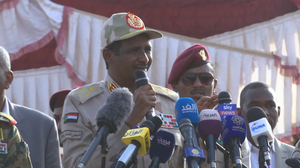
Hemedti speaks at a press conference in Khartoum, July 2019. © AP Archive
Despite an ambiguous law of 2016 placing the militia under the control of the President as supreme commander of the Sudanese armed forces, it suggests that the RSF might not be under the financial control of the military, let alone the civilian elements of the power-sharing Sovereignty Council.
When contacted by Global Witness a spokesperson for the Sudanese military denied that the RSF had a separate budget from the Sudanese Armed Forces.
First
Abu Dhabi Bank, as the owner of, and successor company to, the National Bank of
Abu Dhabi, hadn’t responded to requests for comment by the time of
publication.
Finding #2: Possible front company Tradive General Trading, controlled by Hemedti’s brother, is funnelling money into the RSF
The bank documents appear to show money flowing back and forth between the RSF bank account and the account of a company called Tradive General Trading LLC. Credit notes for Tradive seem to show that it received almost 50 million dirhams (US$11 million) from the RSF in four instalments in April and July 2019. An ‘outward customer transfer report’ from July 2019 has the RSF bank account being paid 48 million dirhams (US$11 million) by Tradive. Global Witness has seen information from the Dubai Department of Economic Development that confirms Hemedti’s brother, Algoney Hamdan Daglo, is a director and an ultimate beneficial owner of Tradive.
In one of the bank documents the purpose of the funds transfer from Tradive to RSF is described as a ‘transfer to sister company’. In the opinion of Global Witness, Tradive is probably an RSF front company, funnelling money in to and out of the RSF at least partly in order to obscure the involvement of the militia.
Tradive itself holds an account at the Sudanese El Nilein bank in Abu Dhabi. El Nilein did not respond to a request for comment on its relationship with Tradive.
Despite repeated attempts to contact Tradive by Global Witness, the company has not commented on these findings.
Finding #3: Hemedti and his family have effectively captured part of the Sudanese gold market, and are likely funding the RSF using these profits
Hemedti’s rise to power is frequently explained partly by his control of the Jebel Amer gold mines in Darfur, and a gold trading company frequently referred to as Al Junaid. (Letters from the organisation indicate that the company group refers to itself as Al Gunade — the same pronunciation but different spelling.)
Global Witness has obtained a corporate document which, for the first time, provides the precise details of Hemedti’s link to Al Gunade.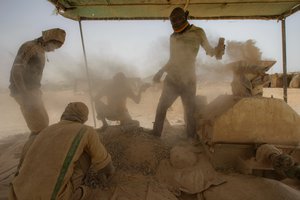
Informal gold miners in the River Nile state gold mines. The Al Gunade industrial group is one of the largest gold companies in Sudan. © Alamy
The Al Gunade gold company is owned by three members of the Daglo family: Hemedti’s brother, Abdul Rahim Hamdan Daglo, and Abdul Rahim’s two young sons, while according to the document, Hemedti himself is on the Board of Directors.
When approached by Global Witness a spokesperson for Al Gunade said that Hemedti had ended his formal role in the company in 2009, and that the corporate document hadn’t been updated. The spokesperson denied that Al Gunade provides any financial support to the RSF but did confirm commercial ties between the company and the RSF. He claimed that certain money movements between Al Gunade and would have related to commercial transactions.
Al Gunade and the RSF appear to be deeply intertwined. Al Gunade’s owner, Abdul Rahim Daglo, is widely reported to be the deputy head of the RSF. A Sudanese Ministry of Minerals press release describes a ministerial visit to Jabel Amer, by invitation of Lieutenant Brigadier Abdul Rahim Hamdan Daglo. In former President al-Bashir’s corruption trial Abdul Rahim Hamdan Daglo was said, by President Bashir’s former office manager, to have received five million euros from the former Sudanese dictator, who handed over the funds in the presence of Hemedti.
Abdul Rahim is also alleged to be partly responsible for the 3rd June massacre. The BBC reported an interview with an anonymous RSF officer that an Abdul Rahim Daglo gave the order to clear the Khartoum sit-in – although the BBC was unable to independently corroborate this claim.
A leaked RSF spreadsheet shared with Global Witness by the Sudanese Al Bashoum Facebook page also suggests close links between Al Gunade and the RSF. The RSF seemingly recorded paying 686,000 Dirham (US $186,000) to wire to an individual for payments to China with a reference to Al Gunade in the same spreadsheet line. Another line of the spreadsheet lists a 50,000 Dirham (US $14,000) payment apparently for the debts of Al-Gunade.
These payments suggest a financial link between the company and the paramilitary group. Evidence of the payments are also interesting in the context of independent reports from Sudanese businesspeople with knowledge of the situation, that the Al Gunade company was in debt in the months leading up to and following the ousting of Bashir – the same financial period covered by the spreadsheet.
In response to a separate investigation by Reuters, the company’s General Manager denied any link to the RSF, reportedly saying “Algunade is as far as can be from the RSF.”
Al-Gunade has expanded in recent years, perhaps in part due to its apparent relationship with the RSF. The RSF famously took control over the large Jebel Amer gold mining area in Darfur by force in November 2017. A map from the state-owned Sudanese Mineral Resources Company shows that Al Gunade has the only large concession operational in Darfur, in the vicinity of Jebel Amer. The region has some the largest mineral and gold reserves in the country, according to the Ministry of Minerals.
Al Gunade now operates well beyond Darfur. In addition to Al Gunade’s office in Khartoum the SMRC mining registry lists the firm as active in South Kordofan, while interviews with traders indicate their presence in the northern Sudanese gold markets of Abu Hamad and Alabidia.
Recently, according to Sudanese media organisation Radio Dabanga, protests by local people in the town of Talodi, South Kordofan against the excessive use of mercury contamination around Al Gunade mine sites led to a heavy handed response from the RSF, who arrived in Toyota Hilux and Land Cruiser vehicles, reportedly injuring civilian protestors in the ensuing clashes.
In sum, the RSF and a connected company have captured a swathe of the country’s gold industry and are likely using it to fund their operations.
RSF VEHICLES AT RISK OF BEING USED IN HUMAN RIGHTS ABUSES WERE BOUGHT IN DUBAI
While the documents discussed above detail some of the sources of the RSF’s economic power, another leaked document sheds light on their military power. This power partly derives from their use of highly mobile units of ‘technicals’ – armed desert vehicles converted from civilian use by welding mounted machine guns on to the back of pick-up trucks.
The leaked RSF spreadsheet seemingly describes how the militia received over 150mn Dirham (US $40 million) ‘for technical support’ from an unknown source, and used over 111mn Dirham (US $30 million) of that to purchase vehicles and communications equipment.
The document suggests that the RSF bought over 1,000 vehicles during the first six months of 2019, from dealers in the UAE. The shipments included over 900 Toyota Hilux and Land Cruisers, models which the RSF frequently converts into ‘technicals’ – 4x4 military vehicles mounted with machine guns.
The spreadsheet helps builds a picture of how the RSF have become Sudan’s most powerful military force. There is no suggestion that Toyota were aware of the use to which these vehicles have been put at the time of their purchase.
THE SPREADSHEET ALSO REVEALS ANOTHER PROBABLE RSF FRONT COMPANY – GSK
One payment made by the RSF is described in the spreadsheet as being made on behalf of GSK Advance, an information technology and security company run by Hemedti’s younger brother Algoney Hamdan Daglo.
According to the spreadsheet several payments were made by the RSF to (or on behalf of) Algoney directly, or to a network of Algoney’s friends and acquaintances who are named in an archived copy of the GSK website as GSK staff members. Some of the line items specify that payments are made by these middlemen on behalf of the RSF (rather than another entity) as part of its procurement activities overseas. Despite repeated contacts, neither GSK, nor Algoney Hamdan Daglo or the middlemen named in the RSF spreadsheet have commented on allegations put to them by Global Witness.
In total, the RSF seems to have paid over 9 million dirhams (US $2.5million) to companies overseas via a network of procurement agents in countries including the UAE, Rwanda, Malaysia and China. Individuals within the network also made visits to Germany, Russia, and the Netherlands, countries to which the spreadsheet shows substantial transfers.
CONCLUSION
Exposing the workings of the RSF’s financial network is a crucial step towards combatting their economic power. If Sudan is to pursue a peaceful democratic transition, it is crucial to ensure civilian oversight of the military spending, and to give the Sudanese people greater control of their own natural resources — that at the moment are dominated by RSF and other security forces within Sudan.
Hemedti sits at the apex of a ‘paramilitary-industrial complex’. He controls both a large powerful military force, and an independent source of wealth. Unless he is removed from this dual position, and all military forces are brought under civilian strategic and financial control, he is an obstacle to the transition to civilian and democratic government that many in Sudan yearn for.
Global Witness contacts: Richard Kent, Nick Donovan, Mohamed Aboelgheit
Find out more
You might also like
-
Blog post Supply chains may sound technical, but they come down to how we value human life and our environment
Along supply chains, we see loss of life and human suffering linked to the metals and minerals that underpin our daily lives. This needs to change.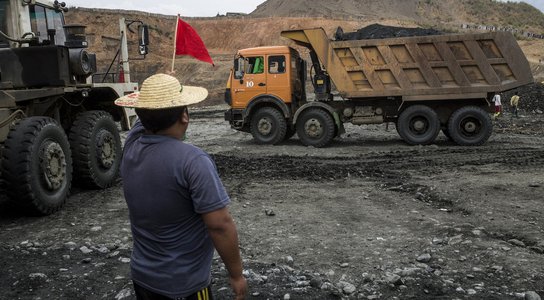
-
Press release Secret documents reveal financial network supporting Sudan’s most powerful militia - responsible for the Khartoum massacre
New evidence reveals how the most powerful military leader in Sudan has captured the country’s gold market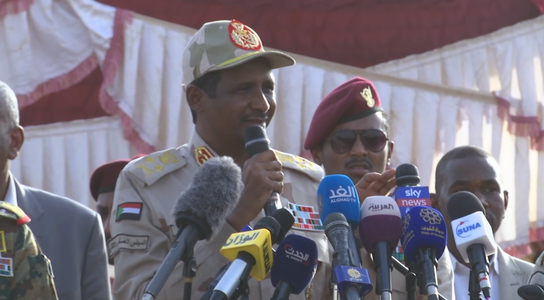
-
Briefing Conflict Minerals in Eastern Congo
Resource-fuelled conflict has contributed to instability in Congo’s east for over two decades.